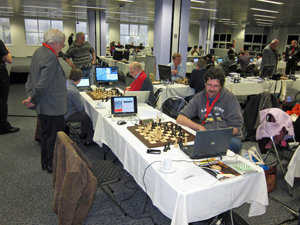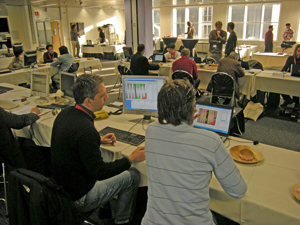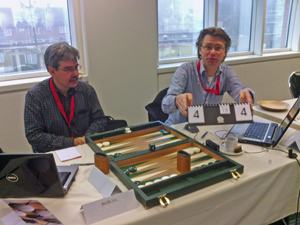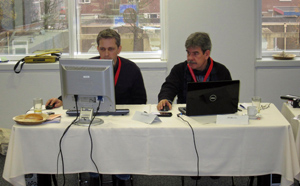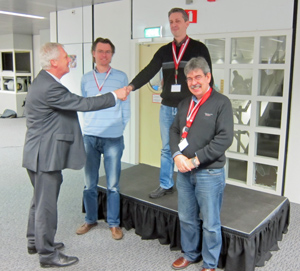After a hiatus of 3 years, again Backgammon competitors found their way to the 16th Computer Olympiad in Tilburg, The Netherlands. As always the event was an enjoyable experience and the organizers deserve thank for their great work. This time not only the arch rivals of the last decade GNU Backgammon, this time operated by Martijn Ruppert and BGBlitz attended but a brand new program, Palamedes by Nikolaos Papahristou. With a little luck two more programs would have attended, which is promising for future events.
Palamedes is a new program that is a little different. It doesn't play Backgammon but plays according the rules for the Greek game Portes. The rules are mostly identical to Backgammon with the following differences:
- The winner of the opening roll rerolls for his first turn.
- The winner scores one point for a normal win and two points for a gammon.
- There is no backgammon.
- There is no doubling cube.
As playing mode was decided best-of-three 15 point matches. To make it possible that Palamedes can compete, we changed the rules in the games with Palamedes accordingly:
- the games against Palamedes were played cube less
- to compensate the missing cube the modus was best-of-three 7 point matches
- the first roll is handled like normal backgammon
- because Palamedes is not aware of backgammons, it was allowed that the Palamedes operator could offer to resign a gammon as a stand-in, which may be accepted or not.
As an additional handicap Palamedes is not aware of the match score. At normal match play, i.e. with the cube, this would be a serious handicap because the cube play in matches is very dependent of the game score, especially at the end of the matches or very asymmetric scores. With cube less play it is a smaller handicap, mainly when gammons don't count anymore.
The games have been exiting and has been in very friendly and relaxed atmosphere. The first Match of GnuBG with BGBlitz was a head-to-head match where the score differs at most by three points, changing several times the lead and ending at double match point with BGBlitz having the better end. In the second match Gnu BG led 8:0 after the first two games where the dice were against BGBlitz. In the next 9 games BGBlitz fought back and managed to equalize to 9-9 and with some lucky dice even took the lead 11-9 after game 11. The match ended with a blitz where BGBlitz didn't managed to come in from the bar in move 5 and ended up loosing 12-15. A 3rd match was necessary, that was virtually decided in move 19 of game 1 where Gnu BG entered two checker from the Bar with a 1-1 and at the same time hit another checker which was a huge swing. BGBlitz could reduce the 8 point lead to an 12-14 but at the end GnuBG won 18-12. The level of play was on a super human level, with error rates of approx. 1 (BGBlitz) and approx. 0.8 (GnuBG). BGBlitz played 4-ply with an neural net that I expected to be the net for 2.8, but finally decided for a different one. Gnu BG played on setting "Grandmaster" which is 4-ply for move and cubes (counting plies from 1. GnuBG starts counting with 0-ply, so in GnuBGterms it was 3-ply)
Then BGBlitz's match against Palamedes followed. The first match was very close, Palamedes using 2-ply played on the level of a very strong human, BGBlitz played nearly without error, but Palamedes won 7-5.
In the 2nd match, the picture remained. BGBlitz played with a better error rate but lost at the end of the day. Or as Professor van Herik coined it "Bgblitz found it's Waterloo in Tilburg" ;)
The story repeated in the matches of Palamedes against GnuBG. GnuBG had the better error rate, but Palamedes won the first match with 7-5. In the 2nd match Palamedes was a victim of not being aware of Backgammons in game 7 giving Gnu BG an decisive advantage, so GnuBG achieved to equalize in matches. In the deciding match Palamedes soon got an advantage and GnuBG couldn't catch up so Palamedes did win with 7-3 and was the winner of Backgammon Event in Tilburg.
Congratulations to Nikolaos Papahristou, a very friendly person, that deserved the win.
P.S.: Later we found out that the ancient Greek Palamedes is to be said the inventor of the dice, so how can you compete with such mighty forces :)
You can find the matches here


